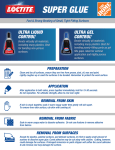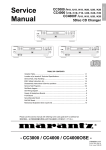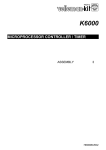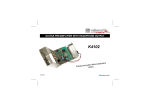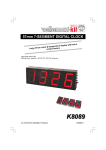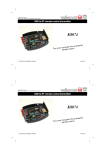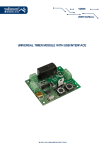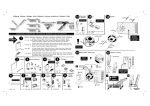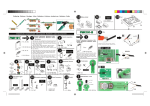Download K8098 Audio Analyzer Manual
Transcript
Total solder points: 123 Difficulty level: beginner 1 2 3 4 5 advanced AUDIO ANALYZER K8098 ra audio gea Give your . look high-tech ILLUSTRATED ASSEMBLY MANUAL H8098IP-1 Features & Specifications Features Specifications measure: peak power (fig.1) RMS power (fig.2) mean dB (fig.3) peak dB (fig.4) linear audio spectrum (fig.5) 1/3 octave audio spectrum (fig.6) auto or manual range selection peak-hold function speaker impedance selection language selection white backlit LCD easy panel mounting 2 power measurement into 2, 4 or 8 ohms + bridged amp option range: 300mW to 1200W @ 2 ohms sensitivity: -34dBu (15.5 mVrms) max. input level: 50Vrms @ 220k frequency range: 20Hz to 20kHz power supply: 12VDC / 75mA dimensions: display: 128 x 64mm / 5 x 2.5" (46 x 24mm / 1.8 x 0.95") front panel: 98 x 51mm / 3.8 x 2" mounting depth: 35mm / 1.37" fig.1 fig.2 fig.3 fig.5 fig.6 ex. reversed fig.4 Assembly hints 1. Assembly (Skipping this can lead to troubles ! ) Ok, so we have your attention. These hints will help you to make this project successful. Read them carefully. 1.1 Make sure you have the right tools: • A good quality soldering iron (25-40W) with a small tip. • Wipe it often on a wet sponge or cloth, to keep it clean; then apply solder to the tip, to give it a wet look. This is called ‘thinning’ and will protect the tip, and enables you to make good connections. When solder rolls off the tip, it needs cleaning. • Thin raisin-core solder. Do not use any flux or grease. • A diagonal cutter to trim excess wires. To avoid injury when cutting excess leads, hold the lead so they cannot fly towards the eyes. • Needle nose pliers, for bending leads, or to hold components in place. • Small blade and Phillips screwdrivers. A basic range is fine. 0.0 00 For some projects, a basic multi-meter is required, or might be handy 1.2 Assembly Hints : ⇒ ⇒ ⇒ ⇒ ⇒ ⇒ ⇒ ⇒ Make sure the skill level matches your experience, to avoid disappointments. Follow the instructions carefully. Read and understand the entire step before you perform each operation. Perform the assembly in the correct order as stated in this manual Position all parts on the PCB (Printed Circuit Board) as shown on the drawings. Values on the circuit diagram are subject to changes. Values in this assembly guide are correct* Use the check-boxes to mark your progress. Please read the included information on safety and customer service * Typographical inaccuracies excluded. Always look for possible last minute manual updates, indicated as ‘NOTE’ on a separate leaflet. 3 Assembly hints 1.3 Soldering Hints : 1- Mount the component against the PCB surface and carefully solder the leads 2- Make sure the solder joints are cone-shaped and shiny 3- Trim excess leads as close as possible to the solder joint REMOVE THEM FROM THE TAPE ONE AT A TIME ! DO NOT BLINDLY FOLLOW THE ORDER OF THE COMPONENTS ONTO THE TAPE. ALWAYS CHECK THEIR VALUE ON THE PARTS LIST! 4 Construction The audio analyzer consist of three parts: the basic module, the display module and the front panel. If required you can mount this kit into a housing, panel, ... In this case use the display gap as a marker reference. First we assemble the basic module. 1. Jumper wire J1 ... J6 2. Horizontal resistors R... R8 R9 R10 R11, R12 R13 R14 R15 R16 R17 R18 : : : : : : : : : : 750 (7 - 5 - 1 - B) 180K (1 - 8 - 4 - B) 2K2 (2 - 2 - 2 - B) 6K8 (6 - 8 - 2 - B) 680 (6 - 8 - 1 - B) 3K3 (3 - 3 - 2 - B) 750 (7 - 5 - 1 - B) 5K6 (5 - 6 - 2 - B) 220 (2 - 2 - 1 - B) 22K (2 - 2 - 3 - B) IC1 : 8p IC2 : 28p 5. HF-Choke 3. Diode. Watch the polarity! D1 : 1N4007 R1 R2, R3 R4 R5, R6 R7 4. IC socket. Watch the position of the notch! : : : : : 470 (4 - 7 - 1 - B) 1K (1 - 0 - 2 - B) 220K (2 - 2 - 4 - B) 33K (3 - 3 - 3 - B) 22K (2 - 2 - 3 - B) CATHODE D... L2 L... L1 : 4700µH (4 - 7 - 2 ) 5 construction 6. Voltage regulator VR1: LM317 9. Electrolytic Capacitor. Watch the polarity ! 8. Pin header 9x 1 C4, C5 : 10µF C6, C7 : 220µF C8, C14 : 4,7µF 9x C... 2 10. Board-to-wire connector (a) 7. Capacitors. SK1 (b) 11. Push button C1…C3 C9 C10 C11 : : : : 100nF 4.7nF 470pF 47pF (104) (472) (471) (47) C12,C13 & X1 are not mounted ! 6 SW1 3 Solderside Mount the button on the solderside ! Construction 12. IC. Watch the position of the notch! 13. Pin header IC1 : MCP6002-E/P Component side IC2 : VKVPA20 programmed DSPIC33FJ32I/SP Display side Mount the female connector on the component side, solder on the display side! 7 LCD 14. Assembly 1.Roughen the 4 bolts with a knife, a file or some abrasive paper so it will be easier to solder them to the front panel. 2. Assemble the unit but do not yet tighten the bolts (fig.1). Fig.1 3. Position the unit onto the rear of the front panel with the display is centred in the cut-away. Temporarily fix the unit to the rear using non-permanent tape (fig. 2). Fig.2 8 LCD 4. Solder 2 diagonal bolts to the front panel. Check if the display is still centred in the cut-away. Solder the remaining 2 bolts (fig. 3). Solder Fig.3 5. Now, fix the whole unit using the 4 nuts and remove the tape. 9 Connection examples 15. CONNECTION Ex. "bridged" amplifier or high power radio DO NOT CONNECT TO K8098 ! Speaker OUT 'Bridged' * Amplifier + Orange + Battery GND / chassis Do not connect! Red Yellow Brown Signal IN OR High-Power car radio GND +12V Battery *Activate BRIDGED function in setup-menu ! 10 Connection examples Ex. connected to speaker output Ex. connected to LINE OUT Yellow Amplifier, ex. K8081 Orange Speaker out + Red Brown - 12VDC TO LINE OUT Yellow Signal IN Orange Signal SIFGNAL IN Red Brown + 12VDC - HINT for stereo connection 10K L+ From Amplifier or Line OUT R+ SIGNAL TO K8098 10K 11 Use 16. USE Short press on the 'mode' button: selecting a meter-display. Long press on the 'mode' button: opening the set-up menu. Set-up menu Access to the Set-up menu by a "long" push on the 'mode' button. Short press: changing settings long press: next function Keep pressed: save changes and exit Speed: refreshing the screen (Fast - Mid - Slow) Impedance: "2", "4" or "8" ohms for speaker output power calculation, in case the unit is connected to speaker output. Power: "AUTO" range or a maximum value that depends on the chosen impedance. For impedance = 2: Possible choices are "1200 mW", "12W", "120W" or "1200W" For impedance = 4: Possible choices are "600 mW", "6W", "60W" or "600W" For impedance = 8: Possible choices are "300 mW", "3W", "30W" or "300W" Sticky Bar: "Yes" or "No" When selected, small residual sticky bars appear also on the third octave spectrum screen. Spectrum dB: "dBu" or "110 dB". (110 dB stands for the "Power dB" display which can range from 80dB to 110dB max, depending on the selected Power range). Advanced settings: see pag. 10 12 Advanced settings Advanced settings First open the set-up menu with a long press on the 'mode' button and choose the mode "advanced settings". Short press: changing settings long press: next function Keep pressed: save changes and exit Language: UK / NL / FR / DE / ES Contrast : choose a contrast between 1 - 20 Reverse video: normal or reverse display True mean: Yes or no. If 'no' is selected then the display gives the integrated "peak values". If a pure sine wave is used both values will be the same. Bridge amplifier: Turn on in case of in car use with high power radio or amplifier. Demo: showing the different screen layouts, you can choose (slow - fast - off) 13 Schematic diagram 17. Schematic diagram R15 750 14 PCB 18. PCB + 15 Modifications and typographical errors reserved © Velleman nv. H8098IP'1 - 2010_rev1 VELLEMAN NV Legen Heirweg 33, 9890 Gavere Belgium - Europe 5 410329 421724
















